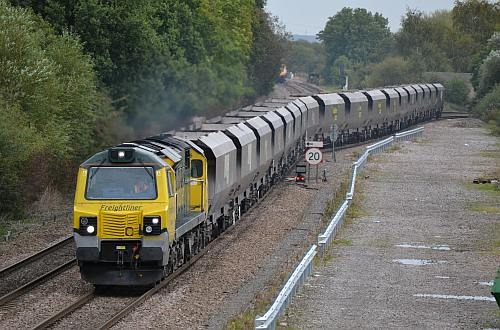ORR calculates that railfreight generates costs of £280-400m per year to Network Rail (NR) through a range of factors such as the impact of heavier trains on infrastructure. It has therefore put forward a new access charging package which it argues will better reflect costs and give businesses certainty to plan for the future.
The plans include a maximum cap of £1.68 per gross tonne kilometre (kgtkm) on the average variable usage charge for track access during Network Rail's 2014-19 funding period, otherwise known as Control Period 5 (CP5), and a new freight-specific charge for commodities which cannot easily switch to road transport, including coal, iron-ore, and nuclear waste. For coal, the charge will be capped at £4.04 per kgtm.
ORR plans to says it will implement the new charges gradually to ensure a smooth transition and enable operators and their customers to plan for the changes. The freight-specific charge will be introduced in 2016-17 and phased in gradually over the following three years. ORR estimates that on average the overall price increase on affected commodities will be 3-5%.
However, the RFG claims that that the variable access charge paid for all freight movements could increase by 23% over current levels, while the freight-specific charge could have significant local impacts. In Scotland, the RFG says the measure will add 15% to the cost of transporting coal from Scottish mines, while the steel sector faces a 9% increase in the cost of ore transport.
"The railfreight sector is committed to increasing its efficiency and contributing to a lower cost railway, but significant increases in access charges such as the potential 23% rise for all traffic risks destabilising the sector and forcing business back to road," says RFG executive director Mrs Maggie Simpson. "ORR has made some welcome decisions, but the overall package of conclusions does not give the comfort and confidence necessary for railfreight to fulfil its potential in the next five-year period. We will be pressing ORR and NR to ensure that a more satisfactory position can be reached by the summer."
The move was also criticised by the Freight Transport Association, which described the proposals as "a heavy blow to modal shift which may halt further railfreight growth."
However, ORR staunchly defends the new regime, arguing that it will reduce the burden of railfreight infrastructure costs on other railway users and the government. "The new charges will mean railfreight operators paying, at most, a third of the costs their services create," says director of markets and economics Mrs Cathryn Ross. "This will help to ease some of the burden on taxpayers and passengers' shoulders."

